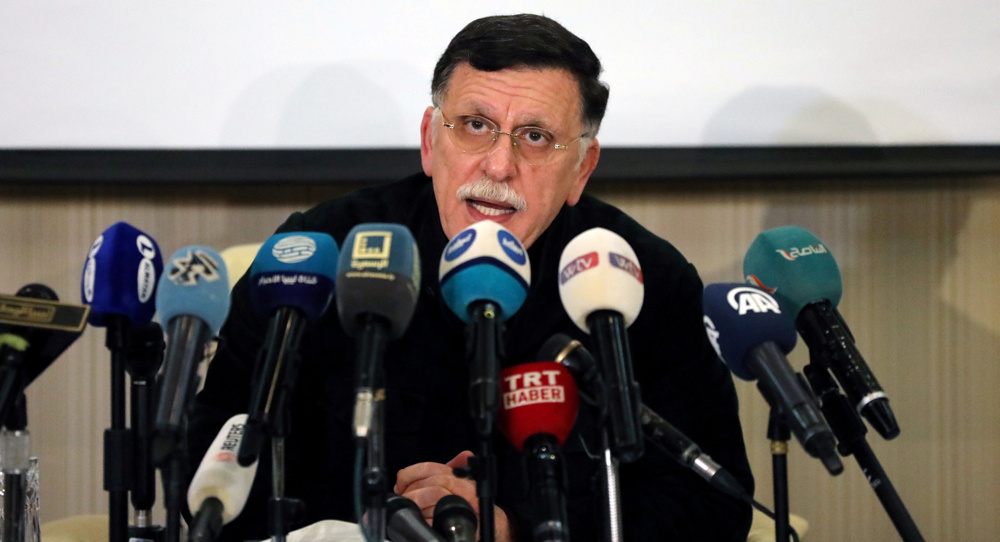At UN, Libyan premier urges rebels to lay down arms, respect ceasefire
The head of the Libyan government has called on rebel forces under the command of renegade general Khalifa Haftar to lay down their weapons and respect a ceasefire that aims to stop violence and help resume oil production in the conflict-ridden North African country.
In a video speech at the United Nations General Assembly on Thursday, Libyan Prime Minister Fayez al-Sarraj warned against the lack of commitment to last month’s ceasefire by Haftar’s militias in eastern Libya and said the rebels would be held to account for any possible casualties due to the ceasefire violations.
"We have not yet seen cooperation from armed groups and the aggressive militias," Sarraj said in his video address.
"In fact, we have only seen hostile remarks from their spokesmen and violations by their forces. Therefore we would hold them responsible for any military confrontations and any resulting casualties and destruction,” he added.
The head of the UN-recognized government also said, "We want peace, not war," and added that the Tripoli-based administration had "welcomed" the announcement of the ceasefire and the resumption of oil production in eastern terminals controlled by Haftar’s forces.
Libya’s Government of National Accord (GNA) and a Haftar-backed parliament in the eastern city of Tobruk agreed last month on a ceasefire and the holding of elections by next March.
Sarraj also called on Thursday for the United Nations’ support in organizing the upcoming vote and said, "Libyans have waited too long for these elections, which will end the legitimacy crisis.”
After recent talks between the two sides in Morocco, the Libyan premier said he was willing to resign as a new government comes together.
Several Libyan cities have in recent weeks been the scene of protests against deteriorating living standards, largely caused by a rebel blockade of energy exports since the beginning of the year. The blockade imposed by Haftar’s militias has cost the oil-rich African country 6.5 billion dollars in lost revenue.
Libya, which sits atop the largest oil reserves in Africa, initially plunged into chaos in 2011, when a popular uprising and a NATO intervention led to the ouster of long-time dictator Muammar Gaddafi.
Since 2014, two rival seats of power have emerged in Libya, namely the GNA led by Sarraj, and another group under Haftar’s command which is based in the eastern city of Tobruk and supported militarily by forces loyal to him — known as the so-called Libyan National Army (LNA).
The strongman, who is primarily supported by the United Arab Emirates, Egypt, and Jordan, launched a deadly offensive to capture the capital Tripoli, the seat of the GNA, in April last year. Despite intense fighting, he has so far failed to achieve his objective of ousting the internationally-recognized government, and the offensive has stalled outside the city.
Turkey has been of significant help to the Tripoli-based government in its defense against the LNA.
Last month, the GNA declared a ceasefire and called for an end to a blockade imposed by the rebels on oil facilities in eastern Libya.
Haftar dismissed the calls, but said last Friday he would lift his blockade on oil outputs for one month,and that he had agreed with the GNA on "fair distribution" of energy revenue.
The rebels started the blockade of the oil facilities in January, when they managed to take control of oil fields and export terminals in the east.
VIDEO | Israeli forces storm West Bank’s Jenin again, target civilians
Iran activates advanced centrifuges after IAEA's 'unjust' resolution
VIDEO | Press TV's news headlines
Iran FM: Response to Israeli aggression 'inevitable'
VIDEO | Iran eases the rules for exporting hand-woven carpets
VIDEO | Intl. Day for the Elimination of Violence against Women: A stark reminder of Gaza women
Australia denies ex-Israeli minister Shaked visa
VIDEO | 85% of Yemeni displaced people face daily hunger crisis
















 This makes it easy to access the Press TV website
This makes it easy to access the Press TV website